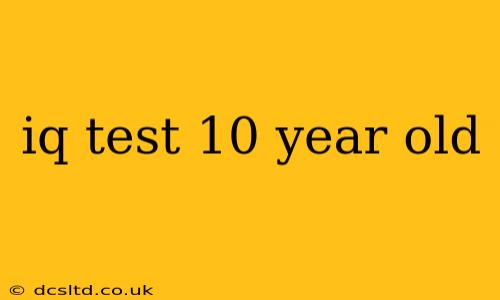IQ tests for 10-year-olds are a significant tool in understanding a child's cognitive abilities and potential. However, it's crucial to approach them with a balanced perspective, recognizing their limitations and the broader context of child development. This article will explore what an IQ test for a 10-year-old entails, its purpose, limitations, and what parents should know.
What is an IQ Test for a 10-Year-Old?
An IQ test, or intelligence quotient test, for a 10-year-old is a standardized assessment designed to measure cognitive abilities relative to other children of the same age. These tests assess various skills, including:
- Verbal comprehension: Understanding and using language effectively.
- Perceptual reasoning: Analyzing visual information and solving spatial problems.
- Working memory: Holding and manipulating information in the mind.
- Processing speed: The speed at which a child can complete cognitive tasks.
Different IQ tests exist, with popular options including the WISC-V (Wechsler Intelligence Scale for Children – Fifth Edition) and the Stanford-Binet Intelligence Scales. These tests are administered by trained professionals, usually psychologists or educational specialists. The results provide an overall IQ score and sub-scores indicating strengths and weaknesses in different cognitive areas.
What Does an IQ Score Mean?
IQ scores are typically based on a mean of 100, with a standard deviation of 15. This means that a score of 100 represents the average for a child's age group. A score above 100 indicates above-average performance, while a score below 100 suggests below-average performance. However, it's vital to remember that:
- IQ scores are not fixed: A child's cognitive abilities can change over time due to various factors, including learning experiences and environmental influences.
- IQ scores are just one piece of the puzzle: They don't fully capture a child's overall intelligence or potential. Other factors like creativity, emotional intelligence, and motivation play crucial roles in success.
- Norm-referenced: The score is relative to the performance of other children in the same age group.
Why Would a 10-Year-Old Need an IQ Test?
Several reasons might prompt a 10-year-old to undergo IQ testing:
- Academic difficulties: Struggling in school despite effort may indicate underlying learning differences that IQ testing can help identify.
- Giftedness: Exceptional academic performance or strong aptitude in specific areas might suggest giftedness.
- Learning disabilities: Suspected learning disabilities such as dyslexia or ADHD can be assessed through cognitive testing.
- Developmental delays: Significant delays in cognitive development could warrant evaluation.
- Neuropsychological evaluation: In cases of suspected brain injury or neurological conditions.
What are the Limitations of IQ Tests?
While IQ tests provide valuable information, it's crucial to acknowledge their limitations:
- Cultural bias: Tests might inadvertently favor children from certain cultural backgrounds.
- Test anxiety: A child's nervousness can affect their performance.
- Limited scope: They assess specific cognitive skills and don't reflect other important aspects of intelligence.
- Over-reliance on standardized tests: Focusing solely on IQ scores can neglect a child's individual strengths and learning styles.
What Should Parents Know About IQ Tests?
Parents should approach IQ testing with informed expectations. It's essential to:
- Discuss the purpose of testing with the psychologist: Understand the reasons behind the testing and the potential implications of the results.
- Prepare the child: Reduce anxiety by explaining the process in age-appropriate terms.
- Consider the entire context: Don't solely rely on the IQ score; consider the child's overall development, strengths, and weaknesses.
- Seek further support if needed: If the results indicate learning difficulties or other needs, work with educators and specialists to develop appropriate support plans.
Is there an online IQ test for a 10-year-old that is accurate?
No, online IQ tests for 10-year-olds are generally not considered accurate replacements for professionally administered assessments. Online tests lack the standardization, controlled environment, and professional interpretation necessary for reliable results. Only tests administered and interpreted by qualified professionals should be used for significant decisions.
What are the different types of IQ tests available for a 10-year-old?
Several types of IQ tests are available, each with its strengths and weaknesses. The most commonly used are the Wechsler Intelligence Scale for Children (WISC-V) and the Stanford-Binet Intelligence Scales. The choice of test depends on the specific needs of the child and the clinician's expertise.
In conclusion, IQ testing for a 10-year-old can be a useful tool when used appropriately and interpreted within a broader context. It's vital to remember that IQ scores are only one aspect of a child's overall intelligence and potential. Parents should work closely with educational and psychological professionals to interpret the results and develop a comprehensive understanding of their child's cognitive abilities.
